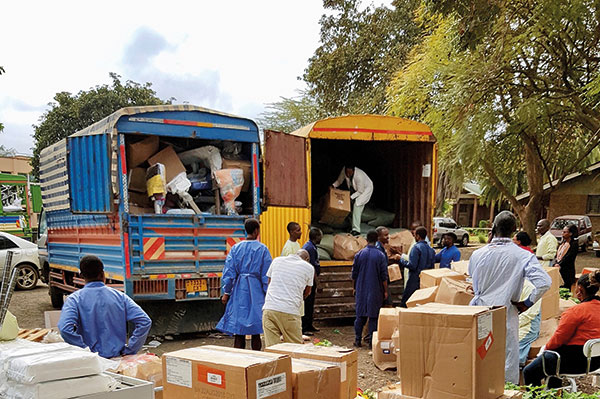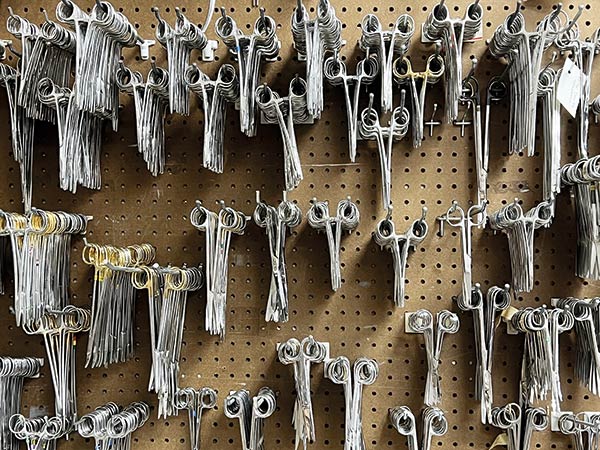Subtotal: $
Checkout-

Masters of Our Tools
-

ChatGPT Goes to Church
-

Poem: “Blackberry Hush in Memory Lane”
-

Poem: “A Lindisfarne Cross”
-

Poem “Fingered Forgiveness”
-

God’s Grandeur: A Poetry Comic
-

Birding Can Change You
-

Disability in The Heaven & Earth Grocery Store
-

In Praise of Excess
-

A Church in Ukraine Spreads Hope in Wartime
-

Toward a Gift Economy
-

Readers Respond
-

Loving the University
-

Locals Know Best
-

A Word of Appreciation
-

Gerhard Lohfink: Champion of Community
-

When a Bruderhof Is Born
-

Peter Waldo, the First Protestant?
-

Humans Are Magnificent
-

Who Needs a Car?
-

Covering the Cover: The Good of Tech
-

Jacques Ellul, Prophet of the Tech Age
-

It’s Getting Harder to Die
-

In Defense of Human Doctors
-

The Artificial Pancreas
-

From Scrolls to Scrolling in Synagogue
-

Computers Can’t Do Math
-

The Tech of Prison Parenting
-

Will There Be an AI Apocalypse?
-

Taming Tech in Community
-

Tech Cities of the Bible
-

Give Me a Place

Send Us Your Surplus
South Sudan’s kids thank you for that shipment of hip-joint ball bearings.
By Matthew Loftus
June 19, 2024
It was always a big deal when a new shipping container arrived at our hospital for women and children in South Sudan. Hospitals or charitable organizations would donate supplies from time to time; it took months for the containers to travel across the world, clear customs, and then arrive by truck. We eagerly unlocked the big metal doors wondering what was inside: Gauze? Non-expired drugs? Surgical drapes to replace the ones that were fraying from constant use?
One day, our hospital staff opened up a container and found that a hospital in America had donated boxes and boxes of … ball bearings for artificial joints. These materials are crucial for joint replacement operations, but our hospital was not capable of performing such surgeries; we exclusively delivered babies and took care of very sick children. One of the boxes somehow got opened and some of the children from a nearby orphanage took to playing with thousands of dollars’ worth of titanium in the red dust of their football pitch.
Our team leaders called it “the blemished lamb syndrome,” referencing the passage in Leviticus: “You shall not offer anything that has a blemish, for it will not be acceptable for you.” Donations to charities and impoverished countries are often the leftovers, the tax write-offs, and the unwanted flotsam of somebody’s inventory. In African markets you find T-shirts celebrating the wrong Super Bowl winner or emblazoned with sponsors of the 2012 Turkey Trot from some small American town. In any mission hospital you will likely find a room full of junk collecting dust; someone brought it over thinking it might be useful and it’s been sitting there ever since. Missionaries and locals alike laugh as they judge the people who have somehow given the opposite of the widow’s mite.

Hospitals throughout the developing world depend on donations from the West. All photographs courtesy of Global Health Ministries.
Admittedly, it can be hard to know what might conceivably be useful to someone somewhere far away. Our family has seen clothes and furniture that we threw away pulled out of the trash pile and put to some kind of use. We do try to give away clothes that we’ve outgrown and things we’re no longer using, but it feels shameful to offer a friend a shirt that has a hole in it. Apparently, it’s a little less shameful to pull such a shirt out of the rubbish bin. But whether trash or treasure, a gift of firstfruits this is not.
More uncomfortably, the topic of unwanted donations brings to mind summer mission trips to Mexico where team after team of gringo teenagers put on Vacation Bible School skits all summer long, or large-scale food aid that props up American farmers while undercutting African ones. There is an entire literature describing “helping without hurting” – it goes well beyond the scope of dumping one’s junk on someone else, and shows how even the best-intentioned gifts can go wrong. Fundamentally, though, the basic problem we often face is that people want to feel like they have done something good without taking the time to ask whether that good thing is as blessed to receive as it is to give. And it is easiest to give away the stuff you weren’t going to use anyway.
The excesses and trash of our world rightly make us uneasy: giant patches of plastic garbage in the ocean, enough food to end world hunger tossed into dumpsters, electronics we trade in after two years of use dumped on African beaches. As a doctor, I think of the American nights on call when I ordered thousands of dollars’ worth of unnecessary tests as a rearguard against personal-injury lawyers. These are symbols of technology’s long shadow: every single-use plastic syringe has to go somewhere when you’re done with it. One of the awful revelations of the last few years has been learning that most plastic simply cannot be recycled and that plastics manufacturers deliberately try to obscure this fact.
“When you invent the ship, you also invent the shipwreck; when you invent the plane you also invent the plane crash,” French theorist Paul Virilio famously said. “Every technology carries its own negativity, which is invented at the same time as technical progress.” The absurdities of excess are yet another manifestation of this law. Excess is technology’s gratuity, a sign that we’ve gone above and beyond what was necessary to survive. We can use that excess for things we don’t necessarily need, since producing abundance allows us to think about more than sustenance. If leisure is the basis of culture, excess is in many ways the basis of generosity. Our ancestors spread their fields with night soil, fermented their leftovers, and used every part of the buffalo because doing so helped them survive; wasting anything could decrease their family’s chances of survival. Nowadays, we have so much excess that “decomposing over centuries in a landfill” is an inevitable part of the life cycle of almost anything we use. There’s no escaping it, either: almost anywhere you go around the world, you will find even the most remote villages littered with plastic trash and discarded auto parts.
In an ideal world, we would have the same “use it up, wear it out, make it do, or do without” attitude of our ancestors, just with more comfortable margins. The excess that the incredible technologies of the present have created would be put to good use, whether that means giving it to those in need or carefully recycling it. (The givers would ideally ask recipients what they wanted before giving it away.) Dorothy Day’s maxim about your extra coat belonging to the poor would be taken seriously, if not literally. Somehow, we would find a way to take all the money that gets wasted on unnecessary MRIs in America and give it to my patients in Africa so that forty-year-old mothers don’t die of cervical cancer.
In reality, we not only throw away a lot of waste, we produce a lot of stuff knowing that it will be simply thrown away after it is no longer usable or fashionable. And we buy a lot of stuff that could easily be called “junk,” wasting the precious money that we are supposed to steward. Wastefulness, like most other vices, only grows stronger the more it is indulged.
The phenomenon of non-fungible tokens (NFTs), which I can still only think of as “Beanie Babies for people who think they are smarter than everyone else,” illustrates how excess can produce its own stultifying impetus to have more for the sake of having more. When you invent the internet, you invent the inane million-dollar picture of a monkey. When you invent the plastic bead, you invent the beanbag chair, the Beanie Baby, the microplastic pollution, and on and on it goes. At least NFTs pollute the air with the carbon it took to make them and then disappear; some Beanie Babies might still be floating in the Pacific when Jesus comes back.
At the same time, all of us in mission hospitals who cluck our tongues at the givers of blemished lambs do so without making too much of a racket. After all, we all depend on donations of money and equipment from people who have chosen to be generous for a wide variety of reasons. The same container that brought the ball bearings had lots of useful stuff in it, and we were able to get a fair amount of treasure out of someone else’s trash. We would not be able to do what we do if there were not an enormous amount of excess.
My career as a medical missionary wouldn’t be possible without technology: the pharmaceuticals, the lab tests, the single-use plastic syringes, and the other day-to-day materials are underpinned by other systems such as computerized insurance authorizations delivered over mobile phones or the airplanes that fly my family and me back and forth to Kenya. In the hospital, we take a much more aggressive approach to making do and wearing out, reusing many “single-use” items (when it is safe to do so), but we still have to throw a lot away at the end of each day. Yet my life would not be possible without the excesses technology has given us; if my friends and supporters were all subsistence farmers using every part of the buffalo, there would be nothing left to buy my plane tickets or our plastic syringes.

Global Health Ministries collects second-hand surgical instruments for hospitals overseas.
I personally cannot say that I always offer the Lord an unblemished lamb myself; my time of prayer is interrupted by a really funny thought I need to post on social media, or my day of missionary service may be punctured by an angry outburst about a broken piece of equipment. (Last week a critical surgery was canceled because the hospital had only one stent for a procedure that required two and I was ready to hurl the iPad I was holding out the window.)
Thrift is a virtue that can be cultivated, but it, too, can be deformed: Ebenezer Scrooge was not a wasteful man. His inability to let any margin be gleaned is the approach we don’t want to take. Nor do we want to be like Judas, grumbling about the cost of perfume for the Lord’s feet. We will always have the poor with us, which means that, as the Levitical law instructs, we must always find a way to leave behind the gleanings for the needy. One imagines, perhaps, that more than a few blemished lambs found their way to a poor man’s table after being rejected at the temple.
Our approach to the problem of waste should be threefold: to cultivate a sense of gratitude, to count the cost, and to give until it hurts.
Gratitude forces us to look at what we have as a gift from God. If you look at what you own as what you are owed, you are likely to decide that you deserve more. If you pretend that your disposable income is entirely under your control, you’ll buy a lot of stuff you simply dispose of. Thanking God for everything – your food, your home, your clothes, and even your toys and other frivolities – gives you freedom from possessiveness. And when what you have is a gift, you feel less inclined to hold on to that excess for yourself.
Counting the cost mostly means living with your trash. Every week the hospital where I work runs its incinerator and the acrid smell of burning plastic wafts over our living quarters. It’s an ever-present reminder of what it takes, technologically speaking, to save lives, a negative externality that many Westerners get to avoid. I suspect that most people would throw less away if there was a law ensuring it was burned within a mile of where it was disposed of. Try burning your own trash for a week and see if it changes the way you consume.
The widow gave her last two coins, but we cannot expect society to run on that same level of moral fortitude. I like what Dorothy Day has to say a lot, but I put myself into a mental health crisis when I tried to run my life with a fraction of her scrupulosity. We are each called to sacrifice differently for the sake of God’s kingdom, but sacrifice applies to everyone and is achievable no matter your station in life.
I think that when it comes to managing your resources, you should give until it hurts at least a little. God wants your heart more than he wants your wealth, but excess wealth is like too much plastic packaging wrapped around your heart. Give more of it away, expose yourself to some of the vulnerabilities that excess shields us from, and offer to God slightly more than you are able to spare from your flock.
So, then, do not store up for yourself trash on earth, where the microplastics do not disintegrate and you depend on the garbage truck to take your stuff away. The abundance generated by technology will always try to tempt you if you can’t restrain it. Rather, be grateful for the excess and put it to good use, for there are many who need it. But for heaven’s sake, please check with us first before you ship it to Africa.
Already a subscriber? Sign in
Try 3 months of unlimited access. Start your FREE TRIAL today. Cancel anytime.











































Erma Perkins
Having returned recently from the annual visit to Zululand Hospice Association (ZHA) in South Africa, I responded to this article, Send Us Your Surplus with “yes, yes, yes." We visited three women in their early 40s with cervical cancer, all without adequate treatment. I came home and visited the hospice patients for whom I volunteer, 98 and 99 years old, wanting to die and escape their failing bodies. “ I just want to go to sleep, but I’m stuck…Get me out of this bed! I want to go to heaven!..Why won't the Lord take me home?” It is a blessing to be able to take the acetaminophen, cortisone cream, triple antibiotic ointment requested by ZHA staff as well as wound care dressings sourced from Intervol of Rochester, NY. We also are given $500 to allow us to take the Nurse Manager to the pharmacy for Ensure, hand wipes, blue gel to address the nerve pain from anti-retroviral medications. The funds we raise from donations and selling items purchased in South Africa allow them to continue their valiant efforts to meet the desperate need. We come home with the gap in the quality of healthcare weighing heavily on our hearts. Lord have mercy, on those dying well before they reach “four score and ten” and all of us who have far more than enough.
Janet Marvar
I have donated to Global Health Ministries for years, usually money, but also some Over-ordered NC masks. This article has me wondering if my money is being used to ship unneeded items to African hospitals. It is not a good gut feeling! Maybe a good-hearted medical missionary should oversee each container's packing. Or maybe, send a list to GHM that has "ONLY necessary items" on it!?
Sandy Brister
Thank-you for all the reminders this article offers… thank you for your work there in Kenya. Blessings. ✝️
Rindy Trouteaud
This is such a thought-provoking article. It is a vivid, heart-breaking illustration of Bob Lupton's book, Toxic Charity. Thank you for your compassionate, prickly honesty...it leads me to re-think my notions and practices of giving.